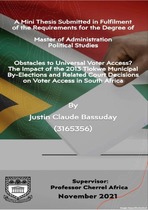| dc.contributor.advisor | Africa, Cherrell | |
| dc.contributor.author | Bassuday, Justin Claude | |
| dc.date.accessioned | 2022-02-01T07:44:38Z | |
| dc.date.available | 2022-02-01T07:44:38Z | |
| dc.date.issued | 2021 | |
| dc.identifier.uri | http://hdl.handle.net/11394/8665 | |
| dc.description | Magister Commercii - MCom | en_US |
| dc.description.abstract | This thesis provides an in-depth explorative case study of the relationship between electoral management and civil rights, using the 2013 Tlokwe By-Elections in South Africa as a case study. The central question in this thesis was: what are the implications of the Tlokwe Ruling on South Africa’s electoral democracy? This topic is extremely important to the field of democracy and elections, as electoral processes become ever more essential in allowing citizens to access free and fair elections. Without the ability to access free and fair elections, the power of citizens to hold leaders accountable is diminished. The study used the framework provided by Diamond and Morlino on the quality of democracy because it contains useful normative values of a democracy and assisted in providing a lens by which to view and analyse elections in a democratic regime. | en_US |
| dc.language.iso | en | en_US |
| dc.publisher | University of Western Cape | en_US |
| dc.subject | Electoral management bodies | en_US |
| dc.subject | Democracy | en_US |
| dc.subject | Elections | en_US |
| dc.subject | Civil rights | en_US |
| dc.subject | South Africa | en_US |
| dc.title | Obstacles to universal voter access? The impact of the 2013 Tlokwe municipal by-elections and related court decisions on voter access in South Africa | en_US |
| dc.rights.holder | University of Western Cape | en_US |

